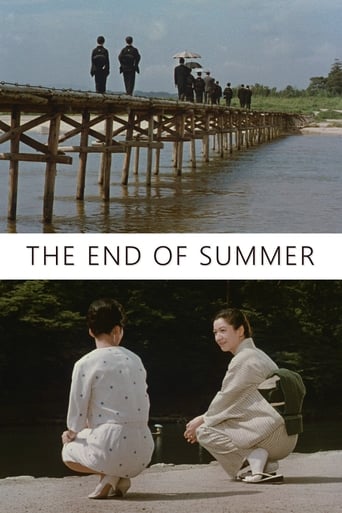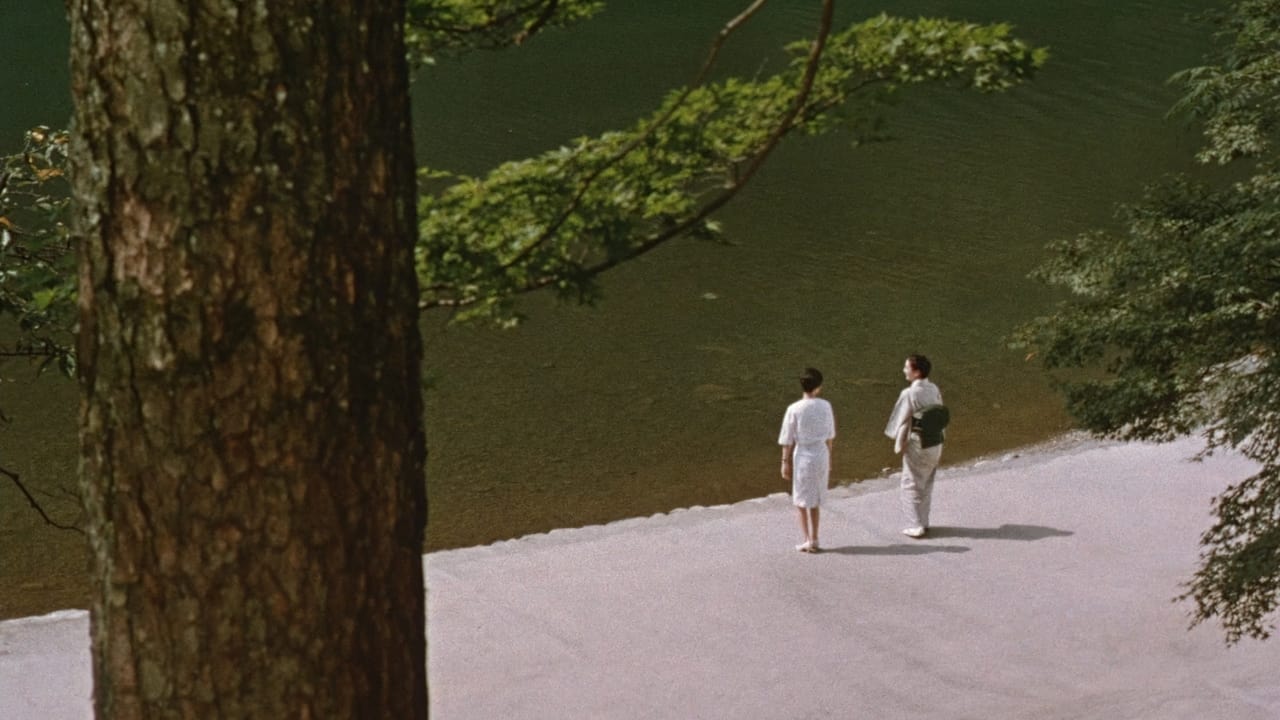Disfear
Of the Ozu films I've seen this one seems to stand out the most; there isn't a single shot of a train, only the sound of distant ones passing. There are attempts at arranging marriages, for a young woman and for a widow, but neither come to fruition. He almost throws a curve ball so to speak, since at the beginning of the film you're given the impression that it's going to be about two widows getting' the hook up, but then it turns out to be more of a study on the widowed father of the Kohayagawa family. There's also one more thing I've yet to have seen in an Ozu film, as far as I can remember: a dead person on screen, usually we're entering the stories of these people's lives after someone has croaked. Definitely the most bittersweet of the Ozu films I've seen thus far, there are moments of genuinely touching comedy and also a few moments of blatant commentary on the modernization of the Japanese woman at the time, with the one daughter whose only regret after her "father" dies is that she doesn't get the mink stole she wanted, not to mention she's going out with a new American guy every other day.
Andres Salama
Ozu's penultimate film is also one of his best. As in many of his movies, the theme here deals with the dynamics of a traditional Japanese family. The aging patriarch of a family has to deal with marrying his two grown daughters (one is divorced with child, the great Setsuko Hara), the financial problems facing his small sake producing business, the reunion with his long lost lover and their capricious daughter and, last but not least, his impending death. The death theme hangs throughout the movie; Ozu was probably thinking of his own death when he filmed this (he would live only a couple of years more); the last shot has black crows standing over the patriarch's gravestone. Ozu's films in color are even better than those in black and white: his famous sense of composition shines even better. Besides, I love color films from the late 1950s and early 1960s period, perhaps because they show us what society look like before the great disruption of the late 60s (this is not personal nostalgia, since I wasn't even born then). Overall, one of Ozu's best films.
SnakesOnAnAfricanPlain
Yasujiro Ozu is, without a single doubt in my mind, in the top five directors of all time. Possibly the second best after my personal favourite Akira Kurosawa. Many may credit my preference due to the fact that Kurosawa was considered as the most Western of all Japanese directors. However Ozu came from the same time and his films are very different but just as good. Ozu's films have the most simple of plots, in that they do not have a strict or interesting storyline. This can sometimes lead to extremely complex situations as Ozu focuses on the trials of Japanese family life. If you are looking for films about real life, and real people, then look no further than Ozu. Like other Ozu films there are arranged marriages, and relationships that cross through all generations. A father is distracted from troubling finance issues by a recently rekindled affair from nineteen years previously. The film is very subtle in its extraction of emotions, Ozu's trademark of not moving the camera once, with completely still shots. Ozu also doesn't use flashbacks, resulting in people simply talking and describing the past. The editing is restrained to simple straight cuts, and no fancy transitions are used. It is this simplicity that some may find boring, or a lack of pacing. For me however it is great to see a master of the craft not give in to unnecessary techniques when the acting and slightly faded picturesque cinematography does all the talking. Dialogue between characters is both intriguing and thought provoking. The final funeral scenes really do demonstrate the beauty of Ozu's films, when we see a couple of complete strangers talk about the recent passing, as we are then treated to a magnificent shot of the funeral procession walking down a bridge. Like 'Tokyo Story' and 'Early Summer', 'The End of Summer' is a thoughtful and delicate piece of work, and also a fine example of Ozu's rare use of colour.
maerte
This film is a little bit disappointing. Ozu did not portrait human emotions as intensive as in "Tokyo Monogatari". Neither has the film the wit and humour of "Ohayo". He did not succeed to characterize the person as good as in other films. The setting of the action in Kyoto instead of Tokyo could have provided the possibility to represent the contrast the conflict between old Japan and "New Japan" in a more distinct way. But unfortunately Ozu produces some cliches. But after all what is a "bad" movie by Ozu in comparison to all the other stuff.


 AD
AD


